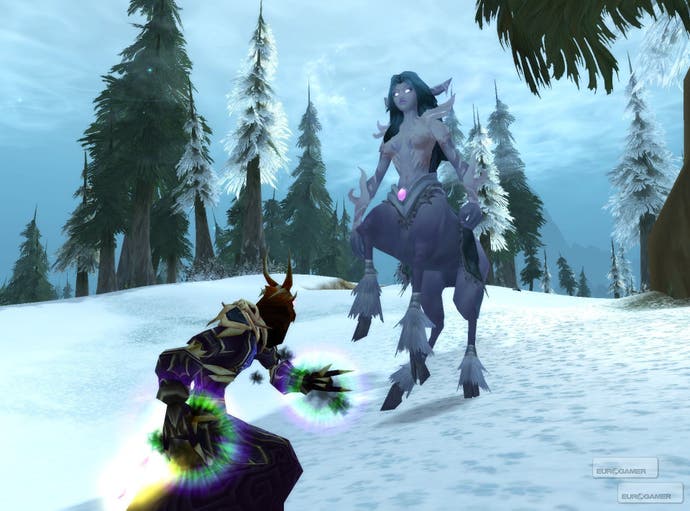Personality Crisis
Conversations with MMO role-players.
Why the attraction? Western MMOs certainly invite it to a certain extent, with their extensive character customisation features and plethoras of social animations. Oakes compares the personal appeal of role-playing to acting, and perhaps even a bit of communal cognitive behavioural therapy. "It's cathartic," she explains, "and in the beginning, it took a lot of bad behaviours out of my life, and gave them a more appropriate outlet. I don't get real life confused with RP, but it does let me feel a lot of the same emotions sometimes, kind of like how dreams get rid of stress. I like to think of it in acting terms: improv, and to some degree method acting. A lot of times the scenario is planned vaguely, with improv filling the blanks."
Oakes admits to an interest in an acting career, but has never pursued it. Her real passions are tabletop role-playing games and graphic novels, and she's building a career in both. "In that way," she decides, "the role-play has served as a way to note what people enjoy in a fantasy world. It definitely helped me be a better GM, and to write stories of interest. I have our RPG ready now, and it could probably go to a publisher in a few months, if it had dedicated work. There's already artwork for it and everything."
This is the case for many of the role-players I surveyed in Oakes' vicinity. On a popular role-playing forum for EverQuest II's premier RP server, Antonia Bayle, a countless number of players had either published, or were in the process of writing, a fantasy/sci-fi novel. In that way, their online community is a sort of sheltered workshop for aspiring creatives of all stripes in the fantasy genre. As with Oakes, though, it also serves a more atavistic purpose. On another RP forum, in between the literary and anime references, players have described their characters as "my true nature", "the mentality I had when serving in the army", "a corruption of how I am in the real world", "my greedy side", and "everything I can't be".
It would seem that, in addition to nourishing certain players' creative skills, RP appears to afford a kind of projected self-exploration; exactly the sort of thing, in fact, that game designers like Warren Spector, Richard Garriott and Peter Molyneux have striven to achieve at various points in their careers.

"I think it awakens the best and worst in us," Oakes reasons, "giving us inspiration to find the lofty ideals of our spirit amidst a world of mundane work and survival. Sure, it's escapism, but for so many of us, it's like living out those fantastic dreams you have once every few years, or actually being the things you've read about in books. It coexists, and helps us improve ourselves by providing a means of collaboration."
Still, the amount of emotional investment role-play seems to necessitate has a downside. Oakes has seen marriages founder because of one partner's RP commitments, and in other cases, players have read far too much into another character's (fictional) advances. "I've seen people be stalked because they thought there was a real relationship," she says. "Once, despite it having a pretty clear disclaimer of a relationship being purely a story element, someone became pretty upset that feelings weren't mutual outside of the game, for a friend of mine."